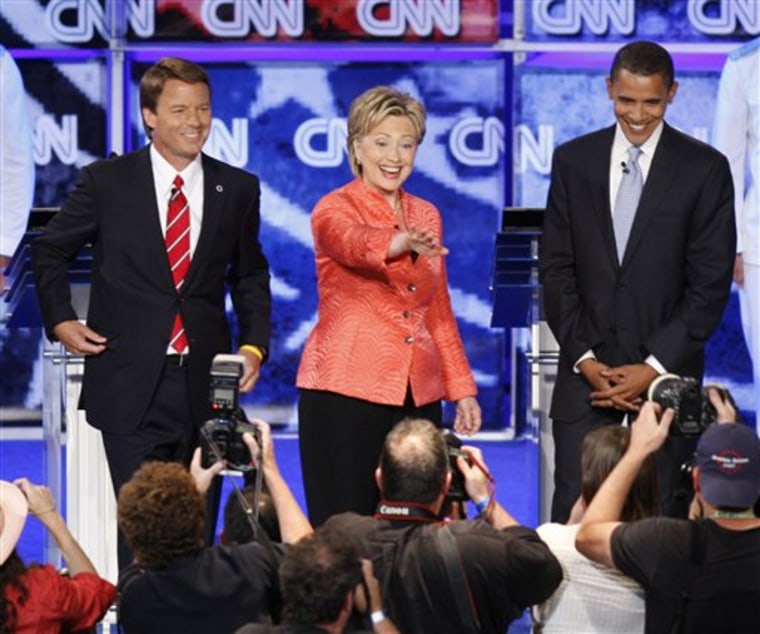Democratic presidential hopefuls struggled Monday night to answer questions posed by young, Internet-savvy voters who challenged the candidates' own place in a broken political system and posed questions about traditional political labels such as "liberal."
"Wassup?" came the first question, from a voter named Zach whose video got the debate off to an unconventional start. He went on to ask how any of the Democrats would do better than the failed leadership in Congress and the White House.
"How are you going to be any different?"
Sen. Barack Obama, a freshmen lawmaker trying to appeal to the public's thirst for change, replied, "One of the things I bring is a perspective ... that says Washington has to change."
His chief rival, Sen. Hillary Rodham Clinton, claimed she has a 35-year-record as an agent of change. "The issue is which one of us will be ready from Day One."
The debate, sponsored by CNN and Google-owned YouTube, featured questions submitted to the online video community and screened by the all-news cable TV network. It was held at the military college of The Citadel in South Carolina, site of one of the earliest primaries _ Jan. 29.
Before the questioning began, CNN opened the two-hour debate with a video from a voter named Chris. "Can you as politicians ... actually answer questions rather than beat around the bush?"
The answer, if with some reservations, was yes. The candidates faced a slew of blunt questions and, in some cases, delivered blunt answers.
To Obama: Are you black enough? "You know, when I'm catching a cab in Manhattan ... I'm giving my credentials," he replied.
To Clinton: Are you feminine enough? "I couldn't run as anything other than a woman."
Her answer drew a challenge from former Sen. John Edwards, who said he was the best advocate for women on the debate stage. "I have the strongest, boldest ideas," he said.
Clinton, Obama and Edwards lead in most polls of the eight-person Democratic field.
Other candidates got in their licks. Gov. Bill Richardson of New Mexico spoke strongly in support of gay rights. Sen. Chris Dodd of Connecticut promised to "bring people together." Rep. Dennis Kucinich of Ohio said he was the only Democrat in the field who voted against giving President Bush authority to wage war and who also voted against paying for the war.
The Democratic gathering marked a turning point in political communications. CNN, a landmark all-news cable network when founded 27 years ago, is now part of a media establishment coming to terms with upstarts like the 2 1/2-year-old online video community.
The debate aside, YouTube has already left its mark on politics. Republican George Allen lost his Senate seat and a likely spot in the 2008 presidential race after a YouTube video caught him referring to a man of South Asian decent as "macaca" _ an ethnic slur in some countries.
In the presidential campaign, buzz-worthy video clips have included Bill and Hillary Clinton's spoof of "The Sopranos" finale, Edwards' combing his hair to the tune "I Feel Pretty," and a boxom model professing her crush on Obama.
